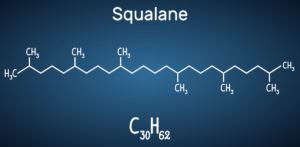In search of natural cosmetic ingredients, many professionals are turning to squalane and incorporating it into their formulations. It is found in many body and face care products. Sophim presents the many benefits of squalane for the skin!
Discover the benefits of squalane for the skin
Squalene is a hydrocarbon, an organic compound containing exclusively carbon and hydrogen atoms. Less commonly known as spinacene or supraene, this isomer has the formula C30H50 and has 30 carbon atoms and 50 hydrogen atoms.
This lipid with a hydrocarbon composition is naturally produced by many representatives of the animal and plant world. It is found in large quantities in certain marine animals: sharks, or Squaliformes, even gave it its name. It is also present in humans, where it is part of the composition of the lipidic film produced by the sebaceous glands of the skin: sebum. It helps to moisturise the skin and maintain a protective barrier.
From squalene to squalane, for varied cosmetic applications
 Squalene is very present, both in the animal and the plant kingdom. In nature, olive trees are known for their high squalene content. It is also found naturally in relatively high proportions in various cereal oils, in rice bran or in wheat germ. Sophim extracts squalane from olives (PHYTOSQUALAN), soya and sunflower (PHYTOSQUALAN VG).
Squalene is very present, both in the animal and the plant kingdom. In nature, olive trees are known for their high squalene content. It is also found naturally in relatively high proportions in various cereal oils, in rice bran or in wheat germ. Sophim extracts squalane from olives (PHYTOSQUALAN), soya and sunflower (PHYTOSQUALAN VG).
Although it can be used in food supplements, squalene is not favoured in its current state by the cosmetic industry. Indeed, this unsaturated hydrocarbon of the alkene type is easily oxidisable.
Through a process of hydrogenation, squalene is transformed into a saturated hydrocarbon, of composition C30H62 (30 carbon atoms and 62 hydrogen atoms). Squalene then exchanges the “e” linked to its alkene status for the “a” linked to its new alkane status: the molecule obtained is called squalane.
Much more stable than squalene, squalane is known for its strong biomimetic properties. It is incorporated into creams, oils, milks and masks for the skin:
- It contributes to emulsions with a very fine structure and a unique sensoriality;
- Its silky, non-greasy feel appeals to many consumers;
- It is odourless,
- Its emollient properties also enable an excellent penetration of the active ingredients in your formulation.
But its cosmetic qualities and its growing success in cosmetics are also linked to its direct benefits on the skin.
A squalane with numerous benefits for the skin
Squalene production slows down considerably after the age of 30. This decrease has multiple consequences:
- In the short term, the reduction in squalene results in dry skin, with the skin becoming less supple and smooth. The lipid barrier degrades, which also leads to a reduction in the protection offered against external aggressions (weather, pollution, etc.).
- In the medium and long term, the reduction in squalene can lead to premature ageing of the skin. Studies have demonstrated the antioxidant properties of squalene, which fights the free radicals that cause oxidative stress.
Squalane, the stable derivative of squalene, has many benefits for the skin:
- It contributes to a better in-depth hydration of your skin;
- It protects you from premature ageing linked to oxidative stress;
- It protects the epidermis from external aggressions;
- It promotes a more luminous and radiant complexion.
Cosmetic products for body, hand or face care can contain squalane.
Squalane is particularly suitable for mature and dry skin. Many cosmetic brands nowadays include it in their body, hand and face care products as an alternative to hyaluronic acid.
Sensitive skin can also, a priori, turn to squalane more easily. This cosmetic ingredient is not known to be a common allergen or irritant. It is therefore unlikely that sensitive skin will react to this particular active ingredient. However, customers with a significant predisposition to allergies should seek medical advice from their GP, allergist or dermatologist.
Your plant-derived squalane and your cosmetic ingredients with Sophim
Do you want to offer your customers healthy, biosourced cosmetic ingredients, plant-derived, produced to the highest quality standards in force? Sophim designs and manufactures in Europe a wide range of references with emollients, texture agents, fixing agents and cosmetic vegetable oils. PHYTOSQUALAN, our plant-derived squalane, is obtained from olives, in an upcycling approach for a considerably reduced ecological footprint.
You can get in touch with your interlocutor at Sophim, contact our teams by phone at (+33)4 92 33 17 17 or send us a message. We will discuss your requirements and our solutions.
Category: Cosmetics Expertise






